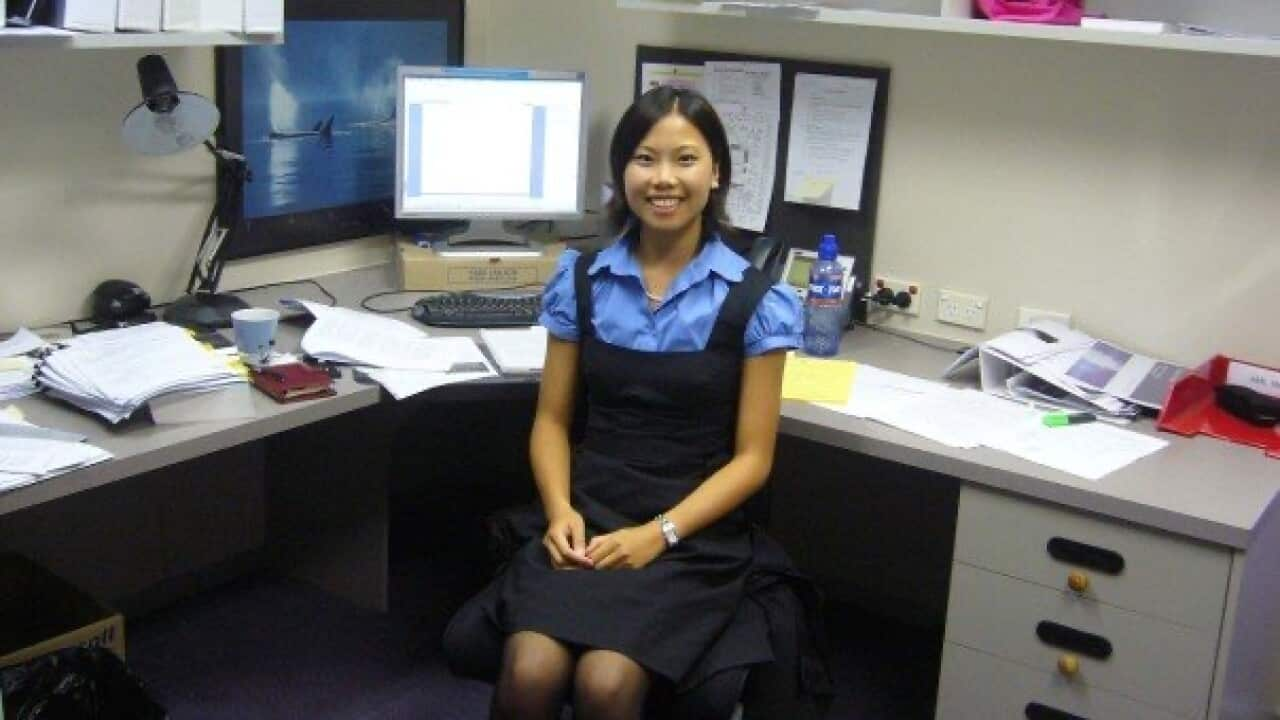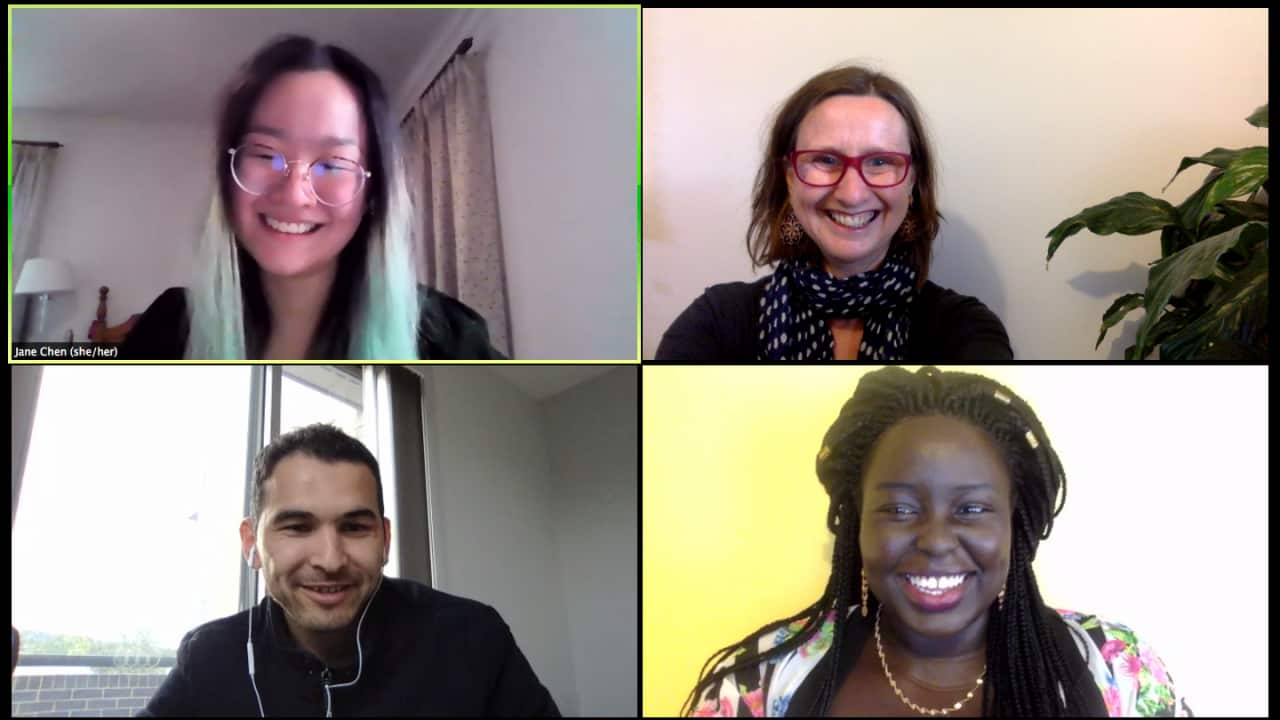For most of her life Qin Qin felt like she owed her life in Australia to former prime minister Bob Hawke's compassion — she sacrificed many years striving to be a "hardworking success machine".
The 38-year-old's father was one of many Chinese students granted visas to stay in Australia after the .
Qin arrived in Australia to join her father in 1989 when she was three years old and quickly adapted to life here, she writes in her book Model Minority Gone Rogue.
She was soon excelling academically, encouraged by her "tiger mother" who enrolled her in piano, violin, Chinese, swimming, art, maths and gymnastics lessons.
Later at university, Qin joined so many societies and events that "people thought I had political aspirations, rather than the beginnings of full-blown workaholism".

Qin Qin poses with her parents on the day when she qualified as a solicitor. Source: Supplied
But Qin eventually began questioning her lifestyle, once writing to a former boyfriend at university: "how can I justify spending the best years of my youth in front of a computer for 80+ hours a week?"
Yet when she was hired by a law firm, Qin applied to be assigned to banking and finance or mergers and acquisitions, because they were the most prestigious areas — and also the most demanding. She was soon working 10 hours a day, six days a week.
Working to repay her parents — and the country
Asked why she pushed herself to work so hard, Qin said it was partly to repay the sacrifice of her parents.
Her mother had worked three menial jobs to support the family while Qin's father completed his master's and then a doctorate.
"There's this internalisation of the sacrifices of our parents who migrated here," she told SBS News.
She also felt "happiness duty", a term coined by academic Sara Ahmed to describe the pressure placed on migrants to be constantly smiling and grateful for their opportunities.
There's this internalisation of the sacrifices of our parents who migrated hereQin Qin
"The underlying basis was fear that drove it all — fear of letting my parents down, not being good enough, not doing enough to repay the debts of my ancestors," Qin said.
"There was pressure that I didn't even realise I was being driven by."
The 'model minority' stereotype 'hurts and harms'
In her book, Qin exposes the reality behind the "model minority" stereotype, which suggests Asians are high-achieving and well-adjusted without the need for the social or economic assistance that other minority groups require.
"[The] model minority is a myth and a stereotype that hurts and harms everyone in a multicultural society such as Australia," Qin told SBS News.
"It refers to Asians being law-abiding, not rocking the boat and apparently 'successful', which hides so many of the things that Asians go through."
(The) model minority is a myth and a stereotype that hurts and harms everyone in a multicultural society such as AustraliaQin Qin
Qin does not want to speak for all Asian people but said she definitely internalised the stereotype that she shouldn't speak out and that professional success was important.
At times her work ethic and respect for authority were taken advantage of, including by a senior associate at a law firm who once asked Qin to complete the footnotes on her university assignment.
"I had never thought to question her authority," Qin wrote.

Qin Qin is the author of the book Model Minority Gone Rogue. Source: Supplied / Benjamin Ling
The Sydney-based lawyer also inherited her parents' attitudes around the importance of education and achievement, and often found herself working alone in the office until midnight.
"It wasn't anyone telling me to do it but I think that personal expectation, that [it] somehow proves my loyalty, my willingness to go above and beyond."

Tu Le works at the Marrickville Legal Centre in Sydney Source: Supplied
"If you're consistently stressed because you're overworked, you're burnt out, you're always pleasing [other people], giving more of yourself without refilling your cup because you want to be seen in the workplace — that is going to damage not only your physical health but your mental health," Orapeleng told SBS News.
Other migrants battle negative stereotypes
Orapeleng noted the model minority stereotype in Australia mostly applies to those from Asian or Indian backgrounds. Other groups face stereotypes about being lazy.
"Often you hear that migrants are abusing systems, there's a narrative that you come [to Australia] and you're on Centrelink," she said. "How many times have people heard 'you should be so grateful that you're in Australia'?"
Orapeleng said there was also an added layer of responsibility for those employed in workplaces where they were one of the only, if not only, diverse member of staff.
"[They think] if 'I'm here, I need to prove myself so that they can employ another migrant. If I mess this up, I've messed it up for all of us'.
"That's a heavy burden to carry."

Sharon Orapeleng says when workers don't feel able to bring their full self to work, it could damage their physical and mental health. Source: Supplied
Annese said their research showed 85 per cent of culturally and racially marginalised (CARM) women felt they had to work twice as hard as workers who were not from a diverse background to get the same treatment or evaluation.
"Lots of people are overqualified and underemployed, and are treated as though they are lower status."
But Tu Le believes workplaces are starting to recognise the benefits of having a diverse workforce that offers a variety of viewpoints and perspectives.
"I think they're shifting [recruitment] to look at how people are a 'cultural add' as opposed to a 'cultural fit'," she said.
The right to speak out
After completing four university degrees, Qin became disillusioned with basing her happiness on her professional success. She eventually took a different path and finally found her voice.
The Canberra writer now works as a librarian with a life "much less driven by fear".
"My life here [in Australia] was based on a prime minister's tears," she said, of Bob Hawke's public display of emotion on Australian TV while describing the massacre of pro-democracy protesters in Tiananmen Square.

Bob Hawke became emotional speaking about the Tiananmen Square massacre. Source: ABC Australia
"They were just fighting for their right to speak out."











